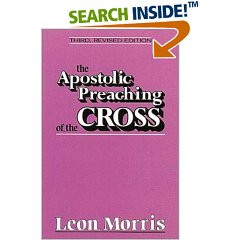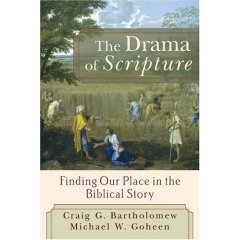Photo Sharing - Upload Video - Video Sharing - Share Photos
Monday, October 30, 2006
The Center of Paul’s Theology and the Order of Salvation

“The central soteriological reality is union with the exalted Christ by Spirit-created faith. That is the nub, the essence, of the way or order of salvation for Paul. The center of Paul’s soteriology, at the center of his theology as whole, then, is neither justification by faith nor sanctification, neither the imputation of Christ’s righteousness nor the renewing work of the Spirit. To draw that conclusion, however, is not to “de-center” justification (or sanctification), as if justification is somehow less important for Paul than the Reformation claims. Justification is supremely important, it is absolutely crucial in Paul’s gospel of salvation” (cf.Eph.1:13). Deny of distort his teaching on justification and that gospel ceases to be gospel; there is no longer saving “good news” for guilty sinners. But no matter how close justification is to the heart of Paul’s gospel, in our salvation, as he sees it, there is an antecedent consideration, a reality, that is deeper, more fundamental, more decisive, more crucial: Christ and our union with him, the crucified and resurrected, the exalted, Christ.
[1] pg. 43 From Richard Gaffin’s “By Faith, Not by Sight: Paul and the Order of Salvation”
Friday, October 27, 2006
This is just sad
Monday, October 16, 2006
Understanding God’s Wrath

In Leon Morris’s book The Apostolic Preaching of the Cross, he gives us some insights on how to think about God’s wrath.
Friday, October 13, 2006
Saturday, October 07, 2006
WJDFW – You Must Be Born Again
“Jesus answered…”Do not marvel that I said to you, “You must be born again”- John 3:5 and 7
[1] pg 37-39
Thursday, October 05, 2006
What Jesus Demands From the World Part 1
I just got my copy of John Piper’s new book, “What Jesus Demands from the World.” In my excitement, I just finished the introductory chapter of the book, where Piper describes his aim for the book in typical Piper-ish fashion:
I can’t wait to dive more into this book and to have my soul satisfied with the presence of God.
Tuesday, October 03, 2006
The Drama of Scripture

“The Drama of Scripture: Finding Our Place in the Biblical Story” by Craig Bartholomew and Michael Goheen is probably the best book I have read all year. In Bartholomew and Goheen’s book, it sets out to help Christians find their purpose within the larger biblical story by organizing the story into a six-act structure:
Act 1: God Establishes His Kingdom: Creation
Act 2: Rebellion in the Kingdom: Fall
Act 3: The King Chooses
Scene 1 A People for the King
Scene 2 A Land for His People
Interlude: A Kingdom Story Waiting for Ending: The Intertestamental Period
Act 4: The Coming of the King: Redemption Accomplished
Act 5: Spreading the News of the King: The
Scene 1 From
Scene 2 And into All the World
Act 6: The Return of the King: Redemption Completed [1]
Not only is this book helpful through it’s six-act structure, in my opinion, it also seems to be making the right emphasis within the larger biblical story. The authors states their 3 emphases as:
1. Comprehensive scope of God’s redemptive work in creation.
“First, we stress the comprehensive scope of God’s redemptive work in creation. The biblical story does not move toward the destruction of the world and our own “rescue” to heaven. Instead, it culminates in the restoration of the entire creation to its original goodness.” [2]
2. The believer’s own place within the biblical story.
“Second, we emphasize the believer’s own place within the biblical story. Some refer to four questions as foundational to a biblical worldview: “Who am I?” “Where am I?” “What’s wrong?” “What’s the solution?” Tom Wright adds an important fifth question: “What time is it?”…As part of our telling of the Bible’s grand story, we will explore the biblical answers to these five questions. [2]
3. Centrality of
“Third, we highlight the centrality of mission within the biblical story. The Bible narrates God’s mission to restore the creation.
[1] pg. 27
[2] pg.12-13
Sunday, September 24, 2006
The Uneasy Conscience
Henry illustrates the need for evangelical to engage with the culture with the following story:
“In a company of more than one hundred representative, evangelical pastors, the writer proposed the following questions: “How many of you,during the past six months, have preached a sermon devoted in large part to a condemnation of such social evils as aggressive warfare,racial hatred and intolerance, the liquor traffic, exploitation of labor or management, erance, or the like-a sermon containing not merely an incidental or illustrative reference, but directed mainly against such evils and proposing the framework in which you think solution is possible?” Not a single hand was raised in response.” [1]
But not only does Henry want evangelical to be active in the societal problems, but he wishes for those action to be grounded in deep biblical reflections. Richard Mouw writes in the foreword:
“Carl Henry’s call to action in the 1940s was not a mere summons to activism. It was an invitation to an evangelical cultural involvement that was based solidly on the kind of profound theological reflection that could only be sustained by a social program that was closely linked to a systematic commitment to the nurturing of the life of the mind. And while the evangelical academy has known much scholarly success in recent decades, there is often a considerable disconnect between grassroots evangelical activism and carefully reasoned theological orthodoxy.” [2]
Finally Henry reminds Christians that only the redemptive power in the gospel can save our society. He writes:
“The evangelical task primarily is the preaching of the Gospel, in the interest of individual regeneration by the supernatural grace of God,in such a way that divine redemption can be recognized as the best solution of our problems, individual and social”. [3]
I highly recommend this book, as a reminder to Christians that we have the only solution to redeem the world. May God give our churches and individuals the wisdom and creativity to use the gospel to solve the problems of the world.
[1] pg. 4
[2] pg. xiii
[3] pg. 89
Sunday, September 17, 2006
Saturday, September 16, 2006
Skinny Models Banned from Catwalk
"Madrid's fashion week has turned away underweight models after protests that girls and young women were trying to copy their rail-thin looks and developing eating disorders.
Organizers say they want to project an image of beauty and health, rather than a waif-like, or heroin chic look." [1]
[1] From CNN
Thursday, September 14, 2006
Piper's New Book: "What Jesus Demands from the World"

The four Gospels are filled with demands straight from the mouth of Jesus Christ. These demands are Jesus’ way of showing us who he is and what he expects of us. They are not the harsh demands of a taskmaster. For example, the demand that we come to Jesus is like the demand of a father to his child in a burning window, “Jump to me!” Or like the demand of a rich, strong, tender, handsome husband to an unfaithful wife, “Come home!” What Jesus demands from the world can be summed up as: “Trust and treasure me above all.” This is good news!
In What Jesus Demands from the World, John Piper has gathered many of Jesus’ demands from the four Gospels. He begins with an introduction that puts the demands in a redemptive-historical context, then concisely examines each demand. The result is an accessible introduction for thoughtful inquirers and new believers, as well as meditative meat for veteran believers who want to know Jesus better.
“The Christian gospel is more than just a wonderful offer of saving grace; it is a demand for supreme loyalty, for surrender to the lordship of Jesus. We forget this too easily in our contemporary church, besieged as we are by a philosophy of pluralism that rejects ultimate authority and a culture of rights that scorns submissiveness. But John Piper reminds us of the real truth: obedience to Christ’s commands is our absolute duty; yet, paradoxically, in his service is perfect freedom and joy!”William J. U. Philip, Minister, St George’s-Tron Church, Glasgow, Scotland, UK
“John Piper reveals in his ‘Word to Biblical Scholars’ his familiarity with the literature and subject matter of the life and teachings of Jesus, and in his comments on the individual demands of Jesus he applies them to everyday living.”Robert H. Stein, Senior Professor of New Testament Interpretation, Southern Baptist Theological Seminary
“This is now my favorite book by John Piper. In the best tradition of Adolf Schlatter’s Do We Know Jesus? and his ‘hermeneutic of perception,’ What Jesus Demands from the World has changed my life and will certainly change yours because it is based on the pure words of Jesus as revealed in the four Gospels. A must-read for every true follower of Christ.”Andreas J. Köstenberger, Editor, Journal of the Evangelical Theological Society; Professor of New Testament and Director of Ph.D. Studies, Southeastern Baptist Theological Seminary
“This book is a special gift from the pen of John Piper. How long has it been since you carefully reflected upon the authoritative commands of Christ? Through these pages you will encounter the Savior and experience the transforming effects of the gospel. Few endeavors are more worthy of your time.”C. J. Mahaney, Sovereign Grace Ministries
“Scholars, popularists, and now even novelists are falling over each other today in a blind passion to discover an alternative Jesus to the One so magnificently portrayed in the biblical Gospels. In stark and refreshing contrast John Piper clear-sightedly grasps the obvious—the biblical Jesus is worth living for and dying for.”Sinclair Ferguson, Senior Minister, The First Presbyterian Church, Columbia, South Carolina
“This is a peculiar book. It assumes that the four Gospels are true and unified. It assumes that Jesus not only does things for us but also makes demands of us. And it assumes that Jesus has authority over everyone regardless of their religion, gender, race, income, sexuality, nationality, or culture. You will likely not agree with every point. But you will hear from a Jesus who is more than a soft-spoken, effeminate, marginalized, Galilean hippie-peasant in a dress and has the peculiar notion that he alone is Lord.”Mark Driscoll, Pastor, Mars Hill Church, Seattle
Wednesday, September 13, 2006
Prosperity Theology

This week's issue of Time magazine has an article on the "prosperity theology" - a message that God promises Christian's material wealth if they are faithful to him, entitled "Does God Want You to Be Rich?".
Al Mohler has a good quote on why "prosperity theology" is so popular in America. He writes:
"Prosperity theology is fueled by the combination of Pentecostal teaching and American consumerism. Our culture of material abundance (and consumerist appetites) is fertile ground for the emergence of this distorted and corrupted teaching. Jesus never promised His disciples material security, much less material prosperity. The benefits of the Gospel of Christ are redefined in terms of material and financial blessings."
Justin Taylor has an interesting proposition on how to react against this "prosperity theology":
"What can we do about this? Very few, if any of us, will be able to have personal contact with someone like T.D. Jakes or Joel Osteen. And most boycotts don't work. But why not write a letter or try to meet with the manager of your local Christian bookstore if they sell books like this, seeking to persuade them that selling books like this is a disservice to the body of Christ? It would be a good way to practice being an ambassador of Christ, it would seek to serve the church, and it's something that might actually make a difference."
Tuesday, September 12, 2006
John Frame's Warning Against Laziness
When I first got into Reformed theology, I thought that everything the popular and modern Calvinist did was "right", especially in relationship to church activities such as expository preaching, hymns, and worship service style, and if a church did not function like a "reformed" church, they were in "sin". Today, I still value and love the old hymns, and I still believe the best way to preach is expository, but I just don't know if the "Reformed" way is the only "right" way to do things at church. So what has caused me to change my view? Probably the greatest influence in changing my view has been a book by John Frame entitled, "The Doctrine of the Knowledge of God", this book simply humbled me, as I thought I knew what was the "right" way to handle and apply scripture to church and life.
Here's are a few quotes from John Frame's article "The Burden of Change: A Warning Against Laziness and Shortcuts" which will give you a flavor of John Frame's view of how Christians should think about Scripture and tradition in relationship to our present time.
1. Applying Scripture in the Present
Historical change is an important part of our ethical situation. As we apply the law of God, we must understand how it applies to each situation that comes before us. That work never ends. We may not assume that the Reformers or the Puritans, for example, finished the task, no matter how great our respect for these great ministers of the Word. The Puritans did not have to evaluate nuclear warfare, genetic engineering, modern science, or the “new age” from Scripture; but we cannot avoid those tasks in our own time.
2. The Danger of Unhealthy Traditionalism
For example, it is not scriptural to approach ethics with a mere traditionalism, a desire merely to emulate the Christianity of a past age. Whether or not we believe that past ages were “better” than this one, our mandate is not to repristinate or recreate a past situation; it is to apply the scriptures to the situation of today. I fear that some churches seek to be mere museum pieces: historical artifacts where people can go to hear old-fashioned talk and experience older forms of church life; spiritual versions of Colonial Williamsburg. On the contrary, Christian worship is to be contemporary, because it must be intelligible (1 Cor. 14), and the church’s preaching must adapt (insofar as Scripture permits) to the language and habits of the target population (1 Cor. 9).
3. Unnecessary Labels
The debate is confused, of course, by words like “conservative,” which are applied both to defenders of scriptural principle and to those who merely defend past ways of doing things without scriptural justification. But defending authentic Biblical principle is one thing; defending the continuance of past applications into our own time is something very different. Both shortcutters and critics of shortcutters need to be more aware of this distinction.
4. Danger of Selfishness
But what masquerades as a battle for Biblical principle is often at bottom a mere rationalization of selfish impulses, a desire to stay comfortable, to avoid having to change familiar patterns. Often, however, Scripture itself is on the side of change! 1 Corinthians 9 is an important text in this respect. Paul was willing to be a Jew among the Jews, a Gentile among the Gentiles, that some might be saved. He did not seek his own comfort, even his own rights. Indeed, he allowed his body to be buffeted, lest while preaching to others he himself should be a castaway. He tried "to please everybody in every way. For I am not seeking my own good, but the good of many, that they might be saved" (1 Cor. 10:33). And note: Immediately after this verse, he urges, “Follow my example, as I follow the example of Christ” (11:1).
This means that in our evangelistic methodology, indeed in our worship (for that too has an evangelistic element, 14:24f), our goal must not be to please ourselves, but to bend and stretch, to accept discomfort and the trauma of change, in order to speak the Christian Faith into the contemporary world
Friday, September 08, 2006
Wednesday, September 06, 2006
Friday, September 01, 2006
USA Basketball and Desiring God
Friday, August 25, 2006
Mark Seifrid: Tolerance in Justification
In Mark Seifrid’s [1] article, “Luther, Melanchton and Paul on the Question of Imputation” [2], he wishes for more tolerance in the divergent opinions in relationship to justification, in particular those who would like to broaden it to include the transformative aspect of God’s divine grace. He argues for this by discussing Luther and Melanchton historical dispute in regards to justification.
Seifrid describes Melanchton view of justification in the period between 1530 and 1534 as somewhat confusing by which he is able to describe justification as a “being made righteous” (transformative) as well as a “being pronounced righteous” (declarative), but later his view appears to change to a “purely forensic terms over against his earlier writings” [3]
[1] New Testament Professor at Southern Seminary
[2] Article found in the book, “What’s at Stake in the Current Debates Justification” pg. 137-152
[3] pg. 142
[4] pg. 141
[5] pg. 145
[6] pg. 143
[7] pg. 150



